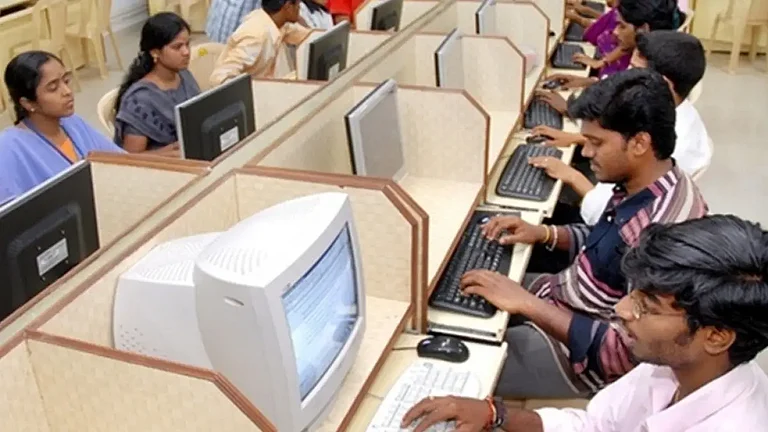Are Business Process Outsourcing (BPO) services at risk of being phased out by Generative Artificial Intelligence? Possibly, there are some warnings. Mumbai-based brokerage firm JM Financial noted earlier this month that GenAI is a key risk for two of India's leading listed BPOs, Sagility Ltd and Inventurus Knowledge Solutions (IKS) Ltd.
GenAI Threatens to Upend Indian BPOs’ Business Model. Are They Ready?
JM Financial’s report noted that GenAI use cases are emerging across healthcare payers and providers to enhance patient care and improve operational efficiency. This could also lead to workforce reductions and force vendors to pass AI-driven cost savings to clients
The brokerage highlighted this risk in its announcement, where it began coverage of these companies. It also pointed to a lack of business diversification and policy uncertainty in the US under former President Donald Trump as additional concerns.
“The rapid advancement of AI-driven solutions, such as virtual scribing and denial prevention, threatens IKS’ offerings (e.g., Microsoft’s Dragon Co-pilot, an AI assistant for clinical workflow),” the brokerage noted. Adding that integration with diverse Electronic Health Record (EHR) systems remains complex, while inaccuracies in AI/ML models can impact client satisfaction.
Both Sagility and IKS were listed on the stock market last year, and since then, their shares have dropped by over 21% and 12%, respectively. Founded in 2021, Sagility manages claims, payments, and clinical services for insurers, with 39,595 employees mainly in India, the Philippines, and Jamaica. Its top five clients have an average tenure of 17 years. IKS, founded in 2006, is 49.54% owned by the Jhunjhunwala family and provides software solutions for hospitals and physicians, including revenue cycle management and data analytics.
JM Financial’s report noted that GenAI use cases are emerging across healthcare payers and providers to enhance patient care and improve operational efficiency. This could also lead to workforce reductions and force vendors to pass AI-driven cost savings to clients.
“With rising IT spending and a focus on ROI, both payers and providers are increasingly favouring established vendors,” the report added.
A Mint report last week, citing analysts, suggested that many of Sagility’s processes, including claims processing, could be automated and eventually taken over by GenAI.
Sagility and IKS compete with Indian firms like Indegene, Firstsource, and eClerx in catering to US healthcare clients, as per the brokage report. The world’s leading Business Process Services (BPS) providers include ADP, Accenture, Teleperformance, Concentrix, Paychex, Foundever, Konecta, Genpact, and TCS, according to Everest Group’s 2024 BPS Top 50 report. However, many of these firms also provide IT software, engineering R&D, and AI-driven services.
Pranav Dalal, CEO and Founder of Office Beacon, a remote and virtual staffing company, says that pure-play BPOs that have not diversified are more vulnerable to AI-driven disruptions.
“Low costs are no longer a primary selling point. Companies now demand efficiency solutions that allow them to scale smarter and faster,” he said.
BPOs Drive a Large Share of India’s Tech Sector
Business Process Outsourcing (BPO), also known as Business Process Management (BPM), is expected to contribute about 18% of India’s total tech sector revenue in FY25, according to NASSCOM’s Annual Strategic Review 2025, published in February.
At the launch event, HCLTech CEO C Vijayakumar said that India’s IT services industry, traditionally built on a linear revenue-to-headcount model, is outdated and must evolve.
“The time is up for that model,” Vijayakumar said at the Nasscom Technology & Leadership Forum (NTLF) in Mumbai. He emphasised that clients now aim to double revenue with half the existing workforce.
“For the last 30 years, revenue growth has been largely linear. That needs to change. Instead of increasing headcount, the focus should be on higher output and outcomes—shifting from people-based to platform-based services. Instead of pure services, we should offer IP-infused solutions, as GenAI brings immense productivity gains,” he told Business Standard in an interview.
According to him, software services can achieve about 30% automation, BPOs around 40-50%, and IT operations about 10-12%.
While AI has not yet significantly impacted Indian BPO companies, early warning signs are emerging, Beacon's Dalal said. He noted that clients now expect higher efficiency, faster turnaround times, and AI-driven insights as part of BPO service packages.
How Are BPOs Responding to the AI Threat?
Anant Sood, Co-founder of Worxogo, highlighted three types of GenAI-driven solutions being adopted by BPOs and IT service providers:
Assisted Agents – AI bots providing contextual information when required.
Augmented Agents – AI tools offering recommendations on actions to be taken.
Autonomous Agents – AI bots executing tasks independently and making decisions.
Worxogo provides AI-led productivity coaching for frontline teams in sales, customer service, and back-office functions.
“All three types of AI agents are being deployed by BPOs and IT firms. The choice depends on the industry, regulatory policies (e.g., stricter healthcare regulations), risk tolerance, and cost-benefit analysis,” Sood explained.
During their Q3 FY25 earnings calls, most listed BPOs addressed the GenAI challenge. Indegene, for example, has been leveraging AI for HTML code automation, reducing the need for certain skill sets. However, complex tasks like medical and regulatory writing still require deep domain expertise that AI cannot fully replicate. Indegene is a life sciences commercialisation firm primarily serving biopharmaceutical firms.
RP-Sanjiv Goenka Group-owned Firstsource acknowledged that GenAI will automate some lower-end processes but argued that new opportunities—particularly in data management and AI-driven trust and safety services—could counterbalance these losses.
“One opportunity for us is to go on the offensive and take market share from larger players who may be reluctant to adopt disruptive AI-based solutions,” said Ritesh Idnani, MD and CEO of Firstsource, during an analyst call.
As AI adoption accelerates, Indian BPOs must adapt, innovate, and diversify their service offerings to stay competitive in the evolving landscape.

